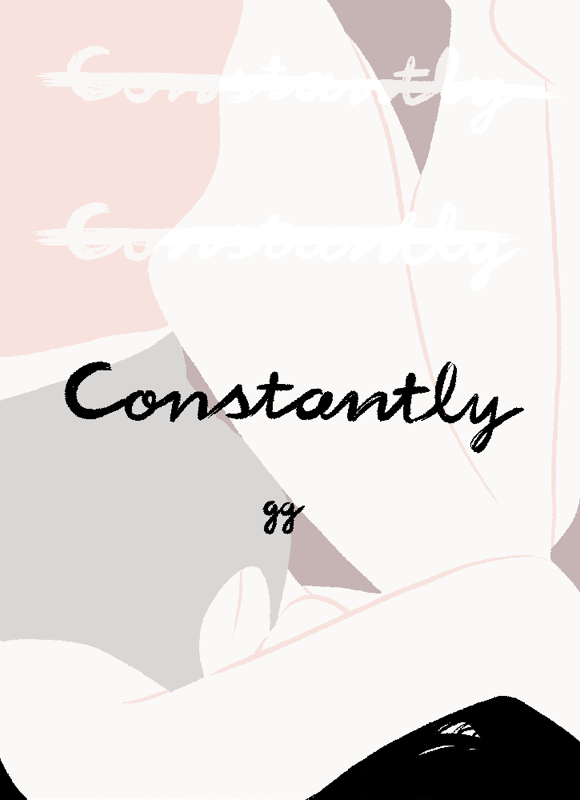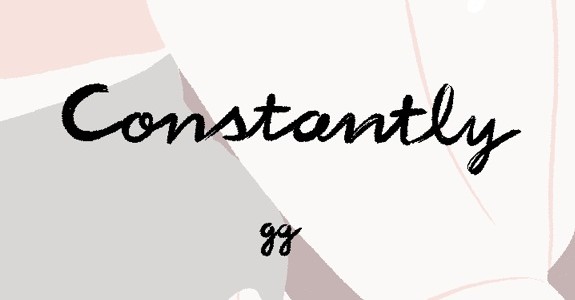
As near as I can tell, the events depicted in GG’s new book, Constantly (her last for Koyama Press and officially the first great comic bearing a 2020 copyright date) all take place within the confines of the apartment or house occupied by its nameless protagonist, but in a less literal — but more accurate — sense, they take place within her mind, her heart and, if you subscribe to the concept, her soul. And they’re happening to a lot or people a lot of the time.
If you’ve ever been friends with, or loved, someone who suffers from depression — or if you suffer from it yourself — the contents of this slim-but-undoubtedly powerful volume are sure to hit home, but odds are that even if your life has been unscathed by the effects of it in any perspective, you’ll at least gain some valuable insights into its actualities thanks to the remarkable visual efficacy of GG’s depiction of it as a “B side” of one’s own existence, something that doesn’t necessarily occur to someone so much as it does with and alongside someone, a “constant companion” that shadows the person afflicted with it in all ways and at all times, a secondary way of experiencing everything that pre-supposes the worst about every experience and even potential experience, to the point where the purportedly “basic” act of, ya know, doing things seems inherently pointless, often explicitly counter-productive. You may have heard “depression’s a bitch,” but if you haven’t lived it yourself, well — I daresay this particular reading experience is as close as you wanna come to it.

To get this across — and to do so with an absolute minimum of words — is no easy task, but it’s one to which GG’s skill-set is perhaps uniquely suited, her masterful blend of high-contrast muted pastel colors, inventive use of space, physical minimalism, and translucent borderline-geometric shapes coalescing in a fashion that’s inherently subtle, but nevertheless packs a sledgehammer blow. This isn’t forceful visual storytelling by any means, but it’s no less powerful for that fact — hell, it’s no exaggeration to say that its “quiet spaces” are where its real power lies. Which means, yeah, this is sophisticated material, but it’s in no way alienating. I’d even go so far as to say that someone who is, for lack of a better readily-available term, “comics illiterate” will have no problem following along here, on both an intellectual and, crucially, emotional level.

In a very real sense, then, even though we never get to know this person’s name, we get to know them, and to understand what they’re going through. In less skilled hands, I would suppose, marrying themes this universal to a story this undoubtedly personal would lead to a kind of internal tension, maybe even a conflict between the two, but you needn’t concern yourself with such “rookie mistakes” here — GG’s been carving out her own artistic space for so long now, and doing the kind of comics no one else can even conceive of, much less execute, that she’s achieved something not even every cartoonist bothers to aspire to, namely: mastery of form, function, and concept. Her way of telling a story is absolutely unique, disarmingly intimate, and unquestionably perfect — and that’s a term that I promise you’ll never hear me invoke unless it’s earned beyond a shadow of a doubt.
Of course, doubt is a constant in this work, but the way that doubt is expressed and communicated is never, well, in any. The calendar just turned, to be sure — we’re only four days in as I write this — but if even a small handful of 2020’s still-forthcoming offerings are this creatively confident, then this will prove to be, as Sinatra said, “a very good year.” Even if that should come to pass, though, GG’s latest will be in a class by itself by sheer dint of its ingenuity, its fluency in its own self-created language — you hear plenty of talk about how one determines if a cartoonist is at the “top of their game,” but at the end of the day, I believe you simply know it when you see it, and you see it here, from first page to last.

If I had any shame, I suppose I’d stop laying superlatives upon a text that depicts the turmoil of a person whose self-esteem and self-confidence are always and forever in question, but my primary responsibility as a critic is to call it as it is — and I have no hesitation whatsoever in labeling Constantly a bona fide masterpiece.
Tags: Best of 2020, Columns, Comic Books, Comics, Depression, Koyama Press


No Comments